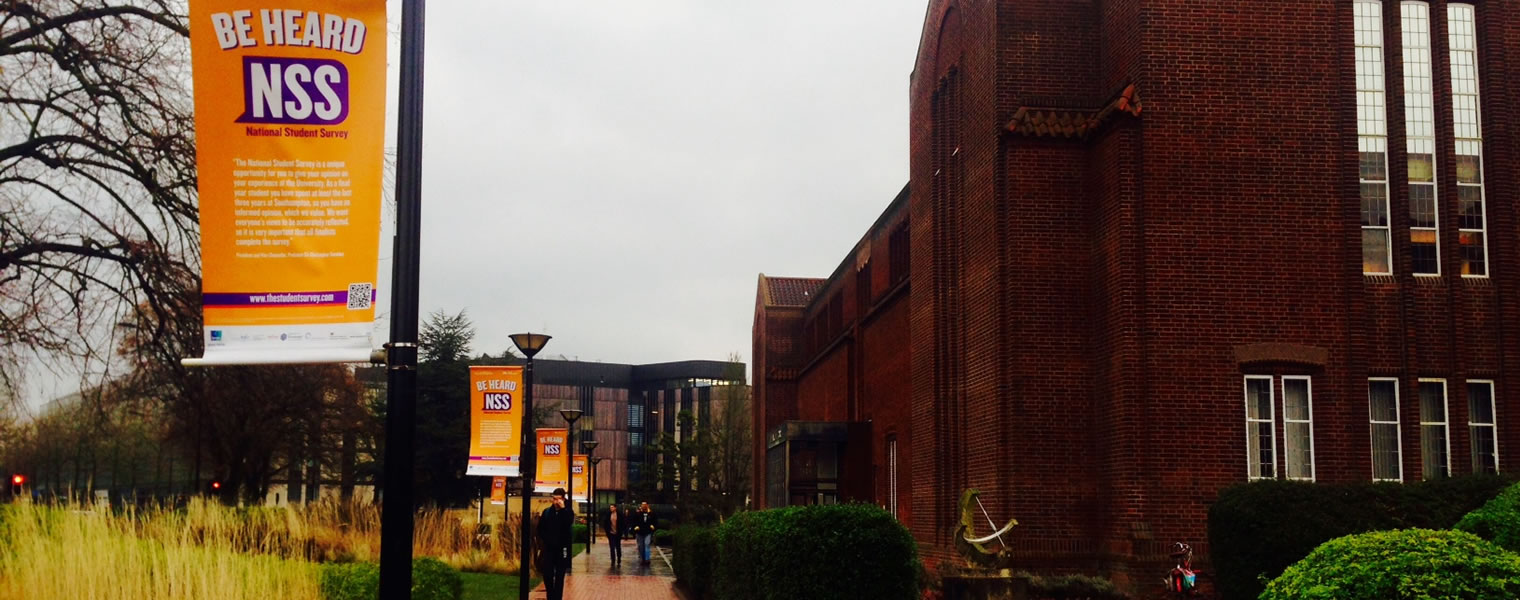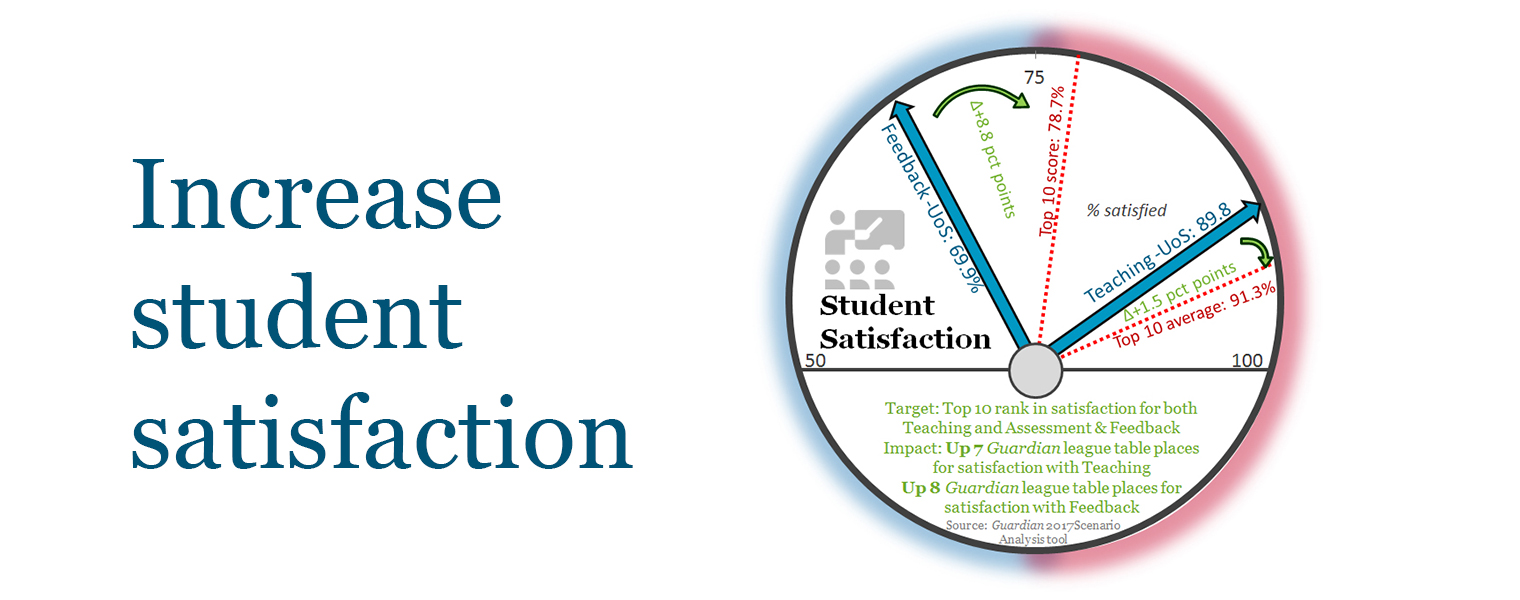Hartley News Online Your alumni and supporter magazine
Initial response rates for this year’s NSS show that 33% of students have filled the survey in since its launch on 6 February. This rate is 22 percentage points higher compared to the same time last year and it’s the highest Week 1 response rate ever at Southampton.
Despite the initial high response, tutors are still encouraged to remind all final-year students to share their views on aspects of their student experience before the survey closes on 30 April. Southampton Connects finds out more.
The NSS is an annual survey for final-year undergraduates across the UK. Although there are a number of different surveys for students, the NSS is unique in giving finalists an opportunity to share their opinions on their experiences at university. Students are asked to respond to 27 questions relating to various aspects of their course. There is also a section for open-ended comments.
Commissioned by the Higher Education Funding Council for England (HEFCE) and carried out by Ipsos MORI, the survey reveals invaluable data related to how students perceive their university, from assessment and facilities to pastoral care and other forms of support.
On its website, HEFCE states that the purpose of the survey is:
To contribute to public accountability, help inform the choices of prospective students and provide data that assists institutions in enhancing the student experience.
The results of the NSS are factored into the University’s planning processes and the participation of undergraduates in the survey can be a legacy to help us improve the experience of future Southampton students.
The University has highlighted the important role played by staff in encouraging students to fill in the survey. Around 40 per cent of last year’s online respondents said they were told about the survey by a lecturer or member of staff.
Many faculties use the dissertation hand-in as an opportunity to mention the NSS and encourage participation. Last year, Geography invited all third-year students to a talk just before they handed in their final piece of work and mentioned the NSS. Some tutors also brought iPads along, giving students the chance to complete the questionnaire at the meeting.
Ocean and Earth Science ran a social media campaign about the NSS and explained the benefits of completing the survey to finalists, while Law students were given a reminder slip when they handed in their dissertation.
Health Sciences used social media to communicate to students about the NSS and offered tickets to a local rock festival as a prize to one lucky student drawn at random from those who completed the survey.
Professor Alex Neill, Vice-President (Education), says:
The most important factor in getting students to complete the survey is encouragement by their lecturers and tutors; academic colleagues have a crucial role in this. The better the response rate, the more representative and hence more useful the results will be. The window between the opening of the survey and the point at which Ipsos MORI start contacting students by phone is much shorter than it has been in previous years – only three weeks – so it is all the more important this year that we encourage early student participation.
Why is the NSS important?
As the President and Vice-Chancellor, Professor Sir Christopher Snowden, mentioned in his all-staff addresses last year, there is a direct correlation between the NSS results and the University’s position in the league tables. This is because overall student satisfaction is used by the various compilers as one of the main criteria for ranking universities.
The NSS results come out in August and the most established UK league tables incorporate them into their rankings, including The Times and The Sunday Times Good University Guide which is the first to include the new data into is table in September. The results are then included in the Guardian League Table and the Complete University Guide in May. Both of these guides, but especially The Guardian, are used extensively by students when gauging the best universities to apply to.
In the National Student Survey last year the University of Southampton came 76th out of 160 UK universities for student satisfaction.
Sir Christopher says the University has the potential to be ranked much higher:
We want to be in the top 10 and it is achievable!
How is this ranking explained? Although parts of the University are performing very well overall, the scores in the NSS were relatively poor in terms of satisfaction with teaching, assessment and feedback.
Sir Christopher continues:
We can improve assessment and feedback. I suggest that colleagues assess less, but in a more effective way. Think about how you give feedback. Students really do want to know what they are doing well or not doing well. A tick is not good feedback. Students say personal academic tutors make all the difference and meeting and talking to them one-to-one is really important.
But the NSS will have even greater consequences under the Teaching Excellence Framework (TEF) which is designed to provide an assessment of the quality of teaching in England’s universities.
Under TEF, universities will be graded gold, silver or bronze and this status will affect what educational institutions can secure from the government in terms of fees. In the future, it may also affect the ability to secure visas for international students.
During the all-staff address, Sir Christopher illustrated the issue by showing one of 12 ‘levers’ that span two of our core principles, Quality and Sustainability. Each lever represents an achievable change that will have a significant impact on achieving our 10-Year Plan.
Referring to the lever, Sir Christopher says:
We’ve got to move the feedback level quite a long way. With teaching, we could do significantly better with less effort. If we fix this, we would go up at least eight places in the league table and TEF would be no worry at all.
As Sir Christopher stressed in his address, we need to act now to make sure we have a higher status in future TEF outcomes. The recently established Student Forum, chaired by Sir Christopher, Alex Neill and Nicky Passmore, Executive Director of Student Experience, provides a way of understanding issues and making changes before they end up as a negative comment in the NSS.
Ipsos MORI guidelines for staff about encouraging students to fill in the survey can be found here.
Staff can find out more information about the survey and the latest response rates on the Institutional Research intranet site.
A presentation for staff to use with students can be found here.
Find out how student feedback has revolutionised the University on the new Student Voice website.

